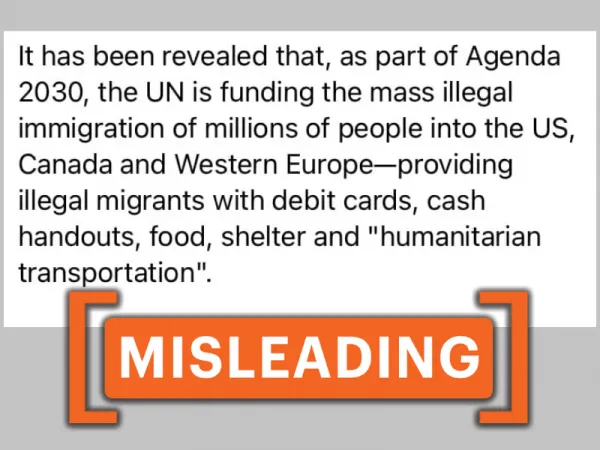By: Anna Aleksandra Sichova
July 12 2024
 Example of the claim circulating on Facebook. (Source: Facebook/Logically Facts)
Example of the claim circulating on Facebook. (Source: Facebook/Logically Facts)
The U.N.'s actions have been mischaracterized - it is providing humanitarian aid to migrants and refugees in transit, not funding illegal immigration.
Context
Social media users have claimed on X (formerly Twitter) and Facebook that the U.N. is funding illegal immigration. Posts claim that “It has been revealed that, as part of Agenda 2030, the UN is funding the mass illegal immigration of millions of people into the US, Canada, and Western Europe—providing illegal migrants with debit cards, cash handouts, food, shelter and ‘humanitarian transportation.’"
The claim is misleading and mischaracterizes the U.N.'s actions. The U.N. is providing humanitarian aid to migrants and refugees in transit, not facilitating illegal immigration into Western countries.
In fact
This claim appears to have originated from an article published by the Center for Immigration Studies in January 2024. The Center for Immigration Studies is a think tank that advocates for low immigration and was co-founded by anti-immigration activist John Tanton. The article uses the United Nations' 2024 Regional Refugee and Migrant Response Plan (RMRP) for Venezuela to explain that the organization is funding illegal migration to the United States.
The referenced U.N. Response plan incorporates 248 non-governmental organizations to aid refugees and migrants traveling to international destinations from Venezuela. This includes providing transportation to minimize human trafficking, supplying food and water, as well as offering cash and voucher assistance to increase food security and help those suffering from gender-based violence.
The RMRP includes a map of populations in transit, illustrating the popular migration routes and points of needed humanitarian aid in South America. The footnote states that the U.N. does not endorse or accept these routes and designations.
It's crucial to distinguish between migrants, illegal immigrants, and refugees. Migrants choose to relocate for various reasons, like economic opportunities, climate change, or family reunification. They are not explicitly protected by international law. Undocumented, sometimes referred to as "illegal" immigrants, enter or remain in a country without following official procedures. The U.N. defines a refugee as someone fleeing persecution or conflict and seeking international protection. Refugees are protected by international law, regardless of how they cross borders.
The use of terms like "illegal immigrant" to describe people receiving humanitarian aid in transit countries is inaccurate and can be misleading. It conflates the act of migration with the legal status upon entering a specific country.
2023 was the deadliest year on record for migrants, with over 8,000 deaths globally. Since 2014, more than 89,200 people have been reported dead or missing during migration in the Americas. The U.S.-Mexico border, the world's second deadliest land crossing, accounts for over half of these casualties.
The 2030 Agenda for Sustainable Development was adopted by all member states in 2015. It comprises 17 goals, such as no poverty, reduced inequalities, and zero hunger.
The U.N.'s 2030 Agenda asserts that migration can be beneficial. "Migrants enrich the world's civilizations by bringing new skills, experiences, cultures, and innovations to host communities,” the U.N.'s International Organization for Migration stated in 2016.
The verdict
This claim is misleading. The U.N. is providing humanitarian aid to migrants in transit through South America. An individual is considered an illegal immigrant only when they have entered a country without going through legal entry channels.